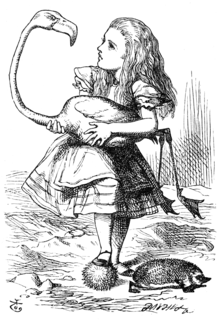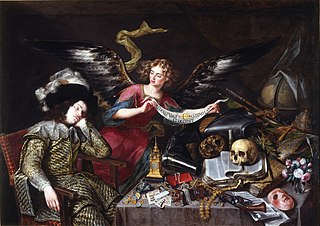
An epic poem, epic, epos, or epopee is a lengthy narrative poem, ordinarily involving a time beyond living memory in which occurred the extraordinary doings of the extraordinary men and women who, in dealings with the gods or other superhuman forces, gave shape to the moral universe that their descendants, the poet and his audience, must understand to understand themselves as a people or nation.
The slave narrative is a type of literary genre involving the (written) autobiographical accounts of enslaved Africans in Great Britain and its colonies, including the later United States, Canada, and Caribbean nations. Some six thousand such narratives are estimated to exist; about 150 narratives were published as separate books or pamphlets. In the United States during the Great Depression (1930s), more than 2,300 additional oral histories on life during slavery were collected by writers sponsored and published by the Works Progress Administration (WPA) of President Franklin D. Roosevelt's administration. Most of the 26 audio-recorded interviews are held by the Library of Congress.
Genre is any form or type of communication in any mode with socially-agreed-upon conventions developed over time. Genre is most popularly known as a category of literature, music, or other forms of art or entertainment, whether written or spoken, audio or visual, based on some set of stylistic criteria, yet genres can be aesthetic, rhetorical, communicative, or functional. Genres form by conventions that change over time as cultures invent new genres and discontinue the use of old ones. Often, works fit into multiple genres by way of borrowing and recombining these conventions. Stand-alone texts, works, or pieces of communication may have individual styles, but genres are amalgams of these texts based on agreed-upon or socially inferred conventions. Some genres may have rigid, strictly adhered-to guidelines, while others may show great flexibility.

Storytelling describes the social and cultural activity of sharing stories, sometimes with improvisation, theatrics, or embellishment. Every culture has its own stories or narratives, which are shared as a means of entertainment, education, cultural preservation or instilling moral values. Crucial elements of stories and storytelling include plot, characters and narrative point of view.
A narrative is a report of connected events, real or imaginary, presented in a sequence of written or spoken words, or still or moving images, or both. The word derives from the Latin verb narrare, "to tell", which is derived from the adjective gnarus, "knowing" or "skilled".
Riḥla refers to both a journey and the written account of that journey, or travelogue. Associated with the medieval Islamic notion of "travel in search of (religious) knowledge", the riḥla as a genre of medieval and early-modern Arabic literature usually describes a journey taken with the intent of performing the Hajj, but can include an itinerary that vastly exceeds that original route. The classical riḥla in medieval Arabic travel literature, like those written by Ibn Battuta and Ibn Jubayr, includes a description of the "personalities, places, governments, customs, and curiosities" experienced by traveler, and usually within the boundaries of the Muslim world. However, the term rihla can be applied to other Arabic travel narratives describing journeys taken for reasons other than pilgrimage; for instance the 19th century riḥlas of Muhammad as-Saffar and Rifa'a al-Tahtawi both follow conventions of the riḥla genre by recording not only the journey to France from Morocco and Egypt, respectively, but also their experiences and observations.

Classical Greco-Roman mythology, Greek and Roman mythology or Greco-Roman mythology is both the body of and the study of myths from the ancient Greeks and Romans as they are used or transformed by cultural reception. Along with philosophy and political thought, mythology represents one of the major survivals of classical antiquity throughout later Western culture. The Greek word mythos refers to the spoken word or speech, but it also denotes a tale, story or narrative.
A literary element, or narrative element, or element of literature is a constituent of all works of narrative fiction—a necessary feature of verbal storytelling that can be found in any written or spoken narrative. This distinguishes them from literary techniques, or non-universal features of literature that accompany the construction of a particular work rather than forming the essential characteristics of all narrative. For example, plot, theme, character and tone are literary elements, whereas figurative language, irony, or foreshadowing would be considered literary techniques.
In contemporary literary studies, a theme is a central topic a text treats. Themes can be divided into two categories: a work's thematic concept is what readers "think the work is about" and its thematic statement being "what the work says about the subject". Themes are often distinguished from premises.

African-American literature is the body of literature produced in the United States by writers of African descent. It begins with the works of such late 18th-century writers as Phillis Wheatley. Before the high point of slave narratives, African-American literature was dominated by autobiographical spiritual narratives. The genre known as slave narratives in the 19th century were accounts by people who had generally escaped from slavery, about their journeys to freedom and ways they claimed their lives. The Harlem Renaissance of the 1920s was a great period of flowering in literature and the arts, influenced both by writers who came North in the Great Migration and those who were immigrants from Jamaica and other Caribbean islands. African-American writers have been recognized by the highest awards, including the Nobel Prize to Toni Morrison. Among the themes and issues explored in this literature are the role of African Americans within the larger American society, African-American culture, racism, slavery, and social equality. African-American writing has tended to incorporate oral forms, such as spirituals, sermons, gospel music, blues, or rap.

Korean poetry is poetry performed or written in the Korean language or by Korean people. Traditional Korean poetry is often sung in performance. Until the 20th century, much of Korean poetry was written in Hanja and later Hangul.

Korean literature is the body of literature produced by Koreans, mostly in the Korean language and sometimes in Classical Chinese. For much of Korea's 1,500 years of literary history, it was written in Hanja. It is commonly divided into classical and modern periods, although this distinction is sometimes unclear. Korea is home to the world's first metal and copper type, the world's earliest known printed document and the world's first featural script.
The setting is both the time and geographic location within a narrative, either nonfiction or fiction. A literary element, the setting helps initiate the main backdrop and mood for a story. Setting has been referred to as story world or milieu to include a context beyond the immediate surroundings of the story. Elements of setting may include culture, historical period, geography, and hour. Along with the plot, character, theme, and style, setting is considered one of the fundamental components of fiction.
Organic unity is the idea that a thing is made up of interdependent parts. For example, a body is made up of its constituent organs, and a society is made up of its constituent social roles.
The following outline is provided as an overview of and topical guide to fiction:
In narrative, a motif (pronunciation) (help·info) is any recurring element that has symbolic significance in a story. Through its repetition, a motif can help produce other narrative aspects such as theme or mood.

Literature, most generically, is any body of written works. More restrictively, literature refers to writing considered to be an art form or any single writing deemed to have artistic or intellectual value, often due to deploying language in ways that differ from ordinary usage.

Fantasy is a genre of speculative fiction set in a fictional universe, often inspired by real world myth and folklore. Its roots are in oral traditions, which then became literature and drama. From the twentieth century it has expanded further into various media, including film, television, graphic novels and video games.











